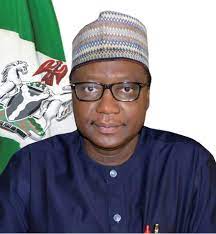….Lauds Tinubu On Oronsanye’s Report Implementation
The Revenue Mobilization Allocation and Fiscal Commission (RMAFC) has commended President Bola Ahmed Tinubu for adopting the Steven Oronsaye Committee’s Report in furtherance of his administration’s sustained efforts aimed at reducing high cost of governance through the restructuring and rationalization of federal agencies, parastatals and commissions.
The commission, in a statement signed by its Chairman, Mr. Mohammed Bello Shehu, noted that high cost of governance was responsible for the reduction in the provision of infrastructure and social services with the attendant drop in investment, high level unemployment and rising insecurity in the country.
The RMAFC boss pointed out that that no society can make meaningful progress unless it developed a competent and cost-effective management system capable of maximizing the nation’s resources to the benefit of all.
Shehu recalled that RMAFC had, over the years, not only advocated for a reduction in cost of governance as a way of preserving scarce resources for the sustainable development of the country but also proffered far-reaching suggestions and recommendations to governments at all levels on the need to scale down on unnecessary expenditures and to monitor expenses on developmental projects that would impact positively on the lives of the citizenry.
According to him, the high cost of governance in Nigeria is caused by the expensive nature of the presidential system of government, large bureaucracy, duplication of government ministries, departments and agencies and endemic corruption.
He listed other factors responsible for the high cost of public service delivery due to infrastructure failure, high-security costs as a result of insurgencies, kidnappings, ethno-religious agitations and armed robbery, multiple salaries and severance allowances; extravagant activities and expenditures, high domestic and foreign debts and weak enforcement institutions.
The RMAFC boss also noted that the cost of governance over the years has been very high and alarming and therefore unsustainable as recurrent expenditure continues to significantly exceed capital expenditure thus negatively impacting on investment, industrial expansion, infrastructural development and growth of the real sectors of the economy.
He, however, expressed optimism that the wholesale adoption of the Oronsaye’s report by President Tinubu administration was laudable as it was capable of drastically reducing the cost of governance that would conserve funds for infrastructural development which would impact positively on the lives of the citizens.
Speaking on the current fiscal and monetary reforms being undertaken by the administration, Shehu explained that the policies of prioritizing price and exchange rate stability to promote sustainable economic growth, and safeguarding the livelihoods of Nigerians is quite commendable.
He explained that such policies will play a crucial role in cushioning the impact of hyperinflation in the economy, adding that “the RMAFC sees price stability and exchange rate stability as good policies in the right direction. The price stability preserves the purchasing power of the national currency, provides confidence to the investors and assists the citizenry to plan their spending and savings more effectively.”
On the administration’s recent policies aimed at reorganizing the Bureau De Change Market to achieve transparent market operations in line with international best practices, the revenue expert projected that “the policy will enhance credibility, transparent operations and build trust among market participants, regulatory authorities, and the public. A reorganized BDC market with clear and open processes contributes to the credibility of the foreign exchange system.”
The RMAFC boss also rated the policy high in potential because it will reduce exchange rate volatility, minimize uncertainties in the foreign exchange market, attract direct foreign investment, improve financial inclusiveness, reduce speculative activities, improve regulatory oversight and ensure effective monetary policy implementation.
Shehu clarified: “When stakeholders have access to accurate information about market conditions, it can lead to more stable exchange rates, reducing volatility and providing a more predictable environment for businesses and investors.
“The country can be assured that through the coordination of policies and the current structural reforms, implementing Oronsaye’s report will bring a more stable exchange rate, control inflation, reduce the cost of governance, and create an enabling environment for businesses and individuals to thrive”, he added.
This is even as he also advised the Committee on the implementation of the Oronsaye’s report to consider the duplication of agencies especially those agencies created after the report between 2014 to date adding that a holistic implementation of the report will save funds for infrastructural development in the country.
In order to cushion the effects occasioned by the subsidy removal, the RMAFC chairman similarly called on the Federal Government and states to judiciously utilize the increased allocations from the monthly Federation Accounts Allocation Committee (FAAC) to provide adequate palliatives to the teeming masses in the country so as to alleviate their suffering.






